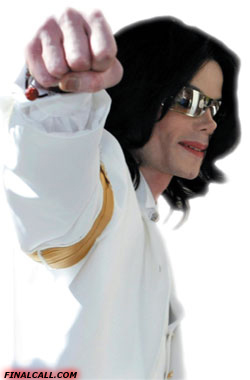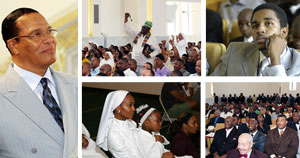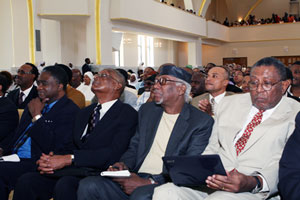By Richard Muhammad -Editor-In-Chief-

Michael Jackson” and how the public campaigns against the pop icon are linked to historical and ongoing attacks against Black leaders.
In addition, Min. Farrakhan shared the spiritual dimensions of Mr. Jackson’s appeal across lines of race, gender, ethnicity, sexual orientation and geography as a sign of the ultimate upliftment of Blacks and all of humanity through the coming of a prophetic figure who destroys division and ushers in God’s kingdom of justice. Min. Farrakhan also said President Barack Obama and his appeal is another “herald,” or sign of this prophetic one, called Messiah by Christians, or Great Mahdi, in Islam.
The two-hour lecture highlighted Mr. Jackson’s growing race consciousness and fears of the pop icon’s potential social and political impact. “Why would we, as intelligent believing people, put Michael Jackson in the same kind of trauma, dilemma, torture and scourging as the man Jesus?” the Minister asked early in his lecture.
“They mocked Jesus. When they crucified him, they had at the top of the cross, ‘Jesus, King of the Jews.’ Michael, also a king was crucified, the so-called king of pop. I see Michael much deeper than those who have talked about him,” said Min. Farrakhan.
His message was broadcast live domestically and internationally through www.noi.org and the flagship mosque was filled, along with overflow rooms in the lower level and at Muhammad University of Islam next door. Min. Farrakhan also revealed, for the first time, that the entertainer donated $100,000 to the historic Million Man March in 1995, along with other causes setting a record with over $300 million in contributions to Africa, charities and children’s causes. Mr. Jackson died June 25. A probe of his death may be turning into a criminal investigation of his doctor and possible manslaughter charges.
Comparing America to the Roman Empire, the Minister explained physical crucifixion in ancient times is manifested today in media coverage and government attempts to discredit and destroy Black leaders and potential leaders. The plots also reflect fulfillment of scripture as Black people of America match the description of the children of Israel under King Herod, and his edict that male babies be slain to prevent the birth of the messiah, he said.
The late FBI director J. Edgar Hoover worked to prevent the “rise of a Black messiah” who could galvanize the Black nationalist movement in the 1960s and 1970s, but all Black organizations, including civil rights groups, were infiltrated and targeted for government surveillance.

“In the modern Rome, America, they have always feared that somebody would rise from among us and unify Black people should they go to war with a foreign government that we might join on with that foreign government and go against them,” the Minister said.
“So there is a Black plot against the Black male and it’s real, brothers and sisters. And any one of us that shows his head as a potential leader, the eyes of our enemies are on that one because if you show that you could be a messianic voice then they will move to silence you,” the Minister said.
Crucifixion was used by Persians, Greeks, Macedonians, Carthaginians and the Romans, reserved for slaves, rebels, pirates and especially for despised enemies and criminals. “Crucifixion was considered a most disgraceful and shameful way to die,” the Minister said.
“Once you were crucified, it’s like you deserved that punishment–so the people are not asking for you to come down, they are happy to see you on that cross. Look at the role the media has played in the crucifixion of Black leaders,” he said.
“You notice how every one that got crucified first got crucified in the media. The media is used to demagnetize the person who has attracted huge crowds. So to demagnetize you means to make you, now, unattractive to the people that once were attracted to you,” Min. Farrakhan said.
Certain Jewish Zionists have been part of the group that sought to control the means by which the crucifixion would take place, he said.
Mr. Jackson also shared his desire to do a movie on the beauty and contribution but Africa but was turned down by friends Steven Spielberg and David Geffen, entertainment industry power houses the Minister said. Mr. Jackson, who like all of Black America was taught that he was ugly, worked to change his appearance and balance out his skin from a disease that made it white, the Minister said.
But his thinking was Black-oriented and lyrics in songs reflected his changing mind, said Min. Farrakhan. “Michael, then, was on his way to the cross because Michael had touched the hearts of people all over the world. Michael touched every race, every culture, every ethnic group, every tribe–there was nothing Michael hadn’t touched,” said the Minister. “And now he’s becoming Dangerous? Dangerous to who? To those who want to keep you ignorant to who you are so they can continue to use us as tools and slaves. It’s not about hate. This is not about anti-Semitism. It’s about showing who is anti-Black.”
“Dangerous” was the title of Mr. Jackson’s 1991 album that debuted as No. 1 on the Billboard music chart.
Lyrics from “They Don’t Really Care About Us,” a single on Mr. Jackson’s 1995 “HIStory” album, were signs of changes in his thinking, the Minister continued. The lyrics in the 1995 song protested the denial of promised freedom, police brutality, racism, hatred and government failures.
Mr. Jackson was made to change the words “kike me” in the song, but the other lyrics were strident protests against problems in society: “I have a wife and two children who love me, I am the victim of police brutality, now I’m tired to bein’ the victim of hate, You’re rapin’ me of my pride, Oh for God’s sake, I look to heaven to fulfill its prophecy and set me free. Skinhead, dead head, everybody gone bad, Trepidation, speculation, Everybody allegation, In the suite, on the news, Everybody dog food, Bang bang, shot dead, Everybody’s gone mad. All I wanna say is that, They don’t really care about us.”
As the Minister read the song lyrics, the crowd exploded into applause.
Min. Farrakhan then shared words from a lecture delivered at Oxford University in 2001 by Mr. Jackson, whose relationship with the Minister started in the 1980s. In the lecture, the entertainer talked about the need to connect parents with children, and of his desire to “recreate the parent/child bond,” the Minister said. The Oxford lecture also contained Mr. Jackson’s deeper understanding of his father in light of his growing up as a “poor Black man in the south, robbed of dignity, bereft of hope, struggling to become a man in a world that saw my father as subordinate,” the Minister read. Mr. Jackson also spoke of coming to see his father’s strong discipline as “a kind of love, an imperfect love” but one driven by never wanting to see his offspring degraded, Min. Farrakhan read.
Mr. Jackson’s appeal, his knowledge and control of a 750,000 song music catalog, worth over $1 billion, which includes his master recordings and groups as varied as the Beatles, Neil Diamond, Elvis Presley, the Staple Singers and the Jonas Brothers, was seen as a problem, the Minister said.
“What you don’t understand about the enemy, when they fear you, the first thing they must do is destroy your reputation. Then, destroy your wealth. And if you’re still alive, (Blacks) can have him now because he’s no more, has no more money,” said Min. Farrakhan.

Despite acquittal on child molestation charges in 2005, the stain of having the media and others label him a child predator persisted. “It doesn’t seem to make any difference if you win in court. Now the only time that he went to court on these charges he won,” said Min. Farrakhan. Mr. Jackson and his attorneys had said the charges were part of an extortion attempt.
In a tape recorded conversation, the father of a boy who settled a $22 million case in 1994 with Mr. Jackson after charging sexual abuse of his son, expressed a determination to go after the singer in 1993, said Min. Farrakhan. The father, Evan Chandler, expressed little regard for the impact of the charges or trial on his son, said the Minister, citing a transcript of July 2, 1993 call with Mr. Chandler.
“It will be a massacre if I don’t get what I want. It’s going to be bigger than all of us put together. This man Jackson is going to be humiliated beyond belief and will not sell one more record,” the Minister said. Mr. Jackson and his supporters said he was the victim of a jealous father who wanted to extort money from the singer. The father also said the assault was bigger than him, included a zealous, “nasty” lawyer and Min. Farrakhan called the attack a conspiracy. “This is the crucifixion. You saw Michael’s color going from Black to White, that’s the outside journey. But the inside journey Michael was going from White to Black,” he said.
Rep. Peter King blasted Mr. Jackson, in early July, using a YouTube video to condemn media focus on Mr. Jackson’s life and legacy. He called the singer “a pedophile,” “pervert,” and “child molester.” While the congressman demanded recognizing Americans who died in Afghanistan heroes, the Minister denounced the vicious attack on Mr. Jackson. He called Mr. King “criminal,” and a “heathen”–and accurately pointed out fighting in the war against terror was based on lies.
The This Is It tour, which included 50 dates and was planned to begin in the summer in London, was the singer’s final tour and his attempt to reclaim his legacy, said the Minister. At the press conference to announce the tour, Mr. Jackson was wearing a military uniform and had a militant demeanor, “looked like an F.O.I. (Fruit of Islam). They didn’t tell you what he was singing but in the end if you looked at his mouth, he said, ‘they don’t care about us,’” he observed. “And when he raised his fist, he was telling the ‘would-be’s’ and the ‘wanna-be’s:’ … You can hang it up. You put my crown on the shelf, because it’s an unreachable star. It’s the unattainable goal. But I am going to show the world that I am Michael Jackson–and I am fighting for my legacy! This is it!”
Days before his death, the Minister said he got a call from someone saying Mr. Jackson had agreed to 10 concert dates, but the contract was set up for 50 dates and there was fear that he would not be able to make the tour dates and lose his catalog. While out of the country, the Minister received word of cardiac arrest and the passing of Michael Jackson.
The Minister expressed concern that a doctor treating Mr. Jackson may have given him an anesthetic because the singer had trouble sleeping. It may be appropriate to charge the doctor with manslaughter, but Mr. Jackson “had a way of getting people to do things for him that wasn’t best,” he said. The singer suffered from addictions to painkillers following a accident where his hair caught on fire during the filming of a commercial in 1984. He also reportedly suffered from the painful disease Lupus.
Min. Farrakhan expressed his hurt and personal sense of loss with the death of the young man he had known and watched for many years. Others who heard the lecture expressed how it expanded their view of Mr. Jackson.
Herb Boyd, a New York-based journalist with the Amsterdam News and OurWorldTodayTV.Net, noted that Min. Farrakhan “made that connection with the universality of Michael Jackson and Barack Obama in conjunction with their lives–one representing that universal sound and Barack representing that universal leadership and how he has brought the whole world together. The two of them represented a kind of unity, a very important unity for humankind,” he said.
George Curry, a writer, media coach and speaker, admitted he had been one of Mr. Jackson’s critics. “But the information that the Minister just disclosed about him giving a hundred thousand dollars to the Million Man March and the various times that he met with him personally. I have now a totally positive impression on the man and I am not an easy person to change impressions,” he said, during an interview at Mosque Maryam.
William Reed, another Black press expert, said, “I didn’t know that there was such an excellent insight and particularly the fact that Michael was a benefactor to the Million Man March in the amount of $100,000. Those kinds of thoughts and those kinds of visions of Michael would help alter the world’s perception of him.”












